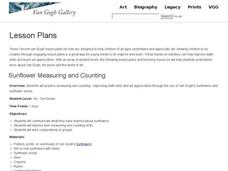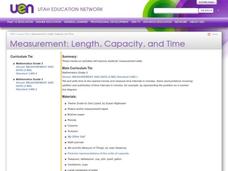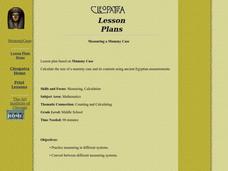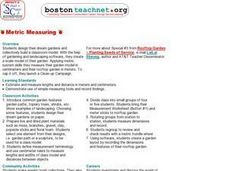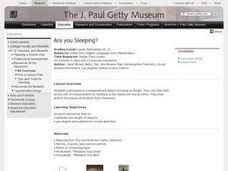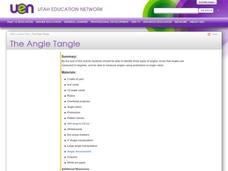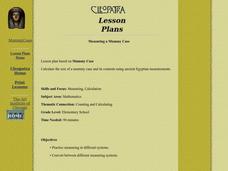Curated OER
It's All in the Measurements
Study customary measurements with your sixth graders. They will investigate linear and capacity measurements to then measure and convert linear and capacity units. Finally they will work in small groups to conduct experiments. Resources...
Curated OER
Sunflower Measuring and Counting
Youngsters improve their measuring and counting skills using sunflowers. They view pictures painted by Van Gogh. Everyone works in groups to measure sunflowers and record their findings, and they all use sunflower seeds to create...
Curated OER
Does it Measure Up?
Use this fun activity with youngsters learning how to use rules for measurement. Each is provided with six steps that direct them to draw specific things with specific heights or lengths. For example, they start by drawing a tree that is...
Curated OER
Making Predictions About Measurement
Upper graders experiment with measurement. They estimate the length, volume, and weight of various objects, then rotate through stations making predictions concerning measurements and then testing their predictions.
Curated OER
Draw an Inch, Walk a Mile
Students work in small groups to solve the problems presented. The main project, mapping the classroom, use these discussions to collaborate in creating a tangible demonstration of their understanding.
Curated OER
Measurement: Length, Capacity, and Time
Third graders listen to Susan Hightower's, "Twelve Snails to One Lizard" and discuss the need for standard units of measurement. They make a body model on butcher paper which they use to measure their body parts and complete a worksheet....
California Academy of Science
How Big is Big?
In a math or life science class, "mini-me" models are created with cardstock to reflect a 1:10 scale of students' bodies. Learners measure each others' heights with meter sticks, and then reduce the size by 10. After this exercise, they...
Curated OER
When a Ruler is Too Short
Students measure distances using parallax. In this math activity, students explain how this method helped astronomers with their studies of the solar system. They determine the length of their arm using parallax and compare it with other...
Curated OER
Measuring a Mummy Case
Students calculate the size of a mummy case and its contents using ancient Egyptian measurements.
Curated OER
Measure Hunt
Second graders measure classroom objects using metric and English rulers to find object which meet preset lengths given to each small group. The group draws pictures of the objects they found meeting their preset limits and present them...
Curated OER
Making Metric And Customary Rulers
Students create a ruler for the purpose of measurement using the standard and metric systems. The rulers are of different lengths and are compared to one another. Then students make conversions of different lengths using both systems of...
Curated OER
Measuring Mixed Numbers
Mixed numbers can be added conceptually, algorithmically, and physically. Have the class visualize mixed numbers by adding fraction bars together. They then discover the algorithmic process that simplifies adding mixed numbers. Finally,...
Curated OER
Metric Measuring
Students design their dream gardens and work together to build a class model. They use software to create a virtual model. They only use metric measurements.
Curated OER
Are You Sleeping?
Here is a measurement lesson focusing on length. Learners use their feet as the unit of measurement for furniture in the classroom and at home, and sketch the pieces of furniture they measured.
Curated OER
Garden Scavenger Hunt
Second graders examine the metric system. In this metric system lesson, 2nd graders compare measurements of common objects in metric units. Students compete in a garden scavenger hunt.
Curated OER
Graph Paper Patterns
Young artists divide a piece of graph paper into sections using rectangles, squares, and triangles. They then fill each section with patterns of shape and color. Elementary graders describe how their patterns are organized. Secondary...
Curated OER
How Long is a Hot Dog? Weight, Weight! Don't tell me!
Primary learners participate in activities that help them explain how different things are measured. They create their own access number chart.
Curated OER
Angles
Fourth and fifth graders investigate angles and name them according to the criteria for obtuse, acute, and right angles. They examine a human-made yarn pattern on the floor of their classroom and identify angles, vertices, and types of...
Curated OER
Measure Me!
Third graders use nonstandard concrete methods to estimate and record measurements of their body.
Pennsylvania Department of Education
Length and Perimeter
Third graders explore tessellations and the spatial concepts used in creating them. In this tessellations lesson, 3rd graders rotate, reflect and transform shapes to create tessellations. Students become familiar with the...
Curated OER
Size Riddles
Students investigate shapes and sizes by creating a riddle. For this geometry lesson, students read one of two books and investigate facts about an object's size. Students write a riddle using the facts they have read and cut...
Curated OER
Measuring Up on the Mayflower
Second graders use a meter tape to compare the length of the Mayflower to a basketball court and make homemade butter for crackers. Afterward, all students sit inside the makeshift Mayflower's dimensions and enjoy their Pilgrim butter.
Curated OER
Measuring a Mummy Case
Young scholars calculate the size of a mummy case and its contents using ancient Egyptian measurements.
Curated OER
Finding Area and Perimeter in a Miniature House Using Standardized Units
Young scholars explore the concept of area and perimeter. In this area and perimeter lesson, students construct miniature houses. Young scholars determine the area and perimeter of their model in order to buy glue, carpet, and wall paper.

